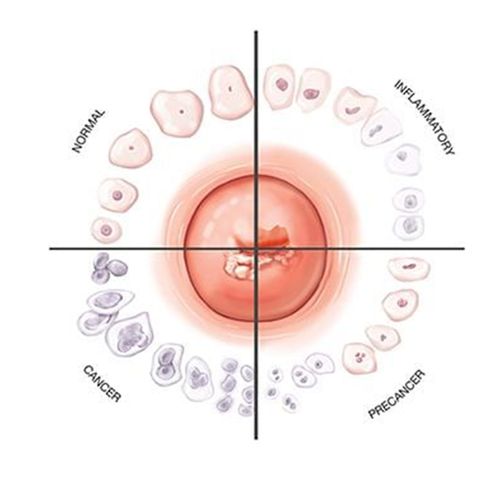Abnormalities in the Pap smears of adolescent and college age women often clear up on their own, according to a study. The research may also help resolve the issue of whether colposcopy—a more invasive, expensive follow-up test-is always warranted in this younger age group.
The Study
Dr. Anna-Barbara Moscicki and colleagues at the University of California, San Francisco, examined 10 years of data on the cervical health of nearly 900 patients between 13 and 22 years of age. All of the women received Pap smears once every four months during the study.
During the study period approximately 187 of these young women received at least one finding of low-grade squamous intra-epithelial lesions (LSIL), microscopic lesions that are usually linked to the presence of the human papilloma virus (HPV), a very common, potentially cancer-causing pathogen. However, 61% of these low-grade lesions simply disappeared on their own within a year after diagnosis. That rate rose to 91% by three years post-diagnosis, according to the investigators.
Implications
The findings confirm the benign nature of this condition in adolescent and young women," the researchers say. Dr. Anne Szarewski and Peter Sasieni, PhD, of Cancer Research UK, the largest nonprofit cancer research facility in Great Britain, believe the UCSF team has "clearly shown just how common and meaningless LSIL is in young women." They conclude there is “no role for colposcopy in adolescents as part of routine (gynecologic] management."
But Dr. Thomas C. Wright, a professor of pathology at Columbia University in New York City, and lead author of cervical cancer screening guidelines issued by the American Society of Colposcopy and Cervical Pathology, expresses concerns. He agrees that there is a very low rate of significant disease-among adolescents, especially. What we'd classify as disease here is usually nothing more than an acute viral infection that usually goes away." However, he says, the study shouldn't lead doctors to consider not performing a follow-up when young women receive a Pap test result with LSIL.
"The study authors are just saying 'wait a while before initiating colposcopy. I do think that's the right tack. It's not that you don't ever need to do colposcopy, it's that you don't need to do it immediately," Wright explains. "First, give the lesion a chance to regress."
If the lesion persists as identified through subsequent Pap smears, colposcopy may be warranted, even in young women, he says.
The new study should ease the fears of young women who receive abnormal Pap results. According to Wright, the findings offer up yet more proof that cervical cancer is very uncommon in this age group.
Pap Smear And HPV
The advent of the annual Pap smear dramatically reduced the incidence of cervical cancer in American women. Current American Cancer Society (ACS) guidelines recommend that adolescents and college-age women see their gynecologist for an annual Pap test within three years of first sexual intercourse or by age 21, whichever comes first.
Wright notes, a small number of women (approximately 1.6%) will receive a Pap test result that includes a finding of LSIL. While most of these low-grade lesions appear to be harmless, in rare cases they can progress to high-grade lesions. Doctors usually treat high-grade lesions to prevent them from turning into cancers. In older patients who have LSIL, gynecologists typically examine the affected cervical tissue with a colposcope, an expensive and Invasive test.
Bottom Line
"The take-home message is that the majority of women with (Pap test] abnormalities who are at or under college age don't need to rush out and get colposcopy," says Wright.
